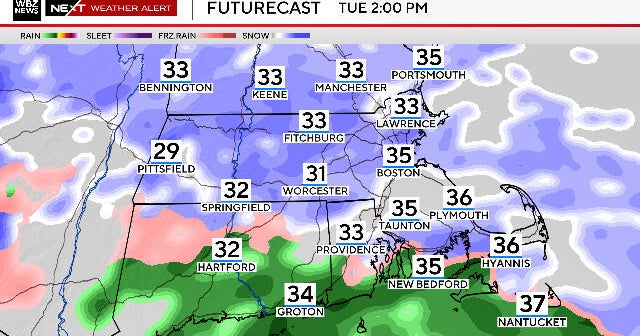Koji Uehara Announces Retirement; His 2013 Red Sox Season Should Be Remembered Forever
By Michael Hurley, CBS Boston
BOSTON (CBS) -- In the modern era, where seemingly any Joe off the street can tickle 101 mph on the radar gun, closers come and go. Some have staying power, but many of them burn and fade nearly as quickly as the time it took for them to arrive.
The true greats, though, are never forgotten. Mariano Rivera. Dennis Eckersley. Rollie Fingers. Trevor Hoffman. Goose Gossage. Hall of Famers, the whole lot of 'em. Enshrined forever in Cooperstown.
One closer who won't end up in Cooperstown but nevertheless touched the sun for one brilliant run was Koji Uehara. At 44 years old, the native of Neyagawa has finally decided to officially hang up his spikes, retiring after pitching in 436 MLB games and 322 games in Japan.
"I want to end my 21-year baseball career today," Uehara said in Tokyo. "There is a part of me that wants to play on, but I decided from the beginning (of the season) that this is my last."
With major league stops with the Orioles, Rangers, Red Sox and Cubs, Uehara logged 480.2 innings in the big leagues. But really, it's the work he put in between April 1 and Oct. 30 of 2013 that was without question one of the most brilliant stretches of pitching in baseball history.
That's no hyperbole, either. An unassuming right-handed reliever who entered that 2013 season as the third man in line for the closer's job -- if he was even really considered for the closer's job to begin with, that is -- ended up authoring a season that can stand toe-to-toe with any single season by any closer ever.
The raw data by itself stands out on its own:
KOJI UEHARA, 2013
73 appearances
74.1 innings
4-1 record
21 saves, 13 holds in 37 save opportunities
33 hits, 9 walks
101 strikeouts
0.565 WHIP
1.09 ERA
11.22 strikeout-to-walk ratio
1.61 FIP
.130 opponents' batting average
You could pick any number out of there and spotlight, but how about this one: In a full season, he walked just nine batters ... but two of those walks were intentional.
That season also included a stretch of 27 appearances from July 9 to Sept. 13 during which he did not allow a single earned run. In that span, he allowed just six hits and one walk over 30.1 innings, striking out 41 out of 96 batters faced, and posting a WHIP of 0.231 over the two-month stretch.
Right in the middle of that stretch, Uehara made 11 consecutive perfect appearances -- 36 up, 36 down over 12 innings of work. Zero hits, zero walks, zero base runners, 17 strikeouts. He threw 142 pitches over those 11 appearances, 82 percent of which went for strikes.
Stretching it back a bit further, from July 2 through Sept. 13, he pitched 33.2 innings over 31 appearances without allowing an earned run. Opponents batted .074 against him and reached base at an .091 clip, as he logged 45 strikeouts and walked just two batters.
Uehara then had his singular hiccup on Sept. 17, giving up an earned run and taking a loss in what was a mostly meaningless mid-September meeting with Baltimore. The Red Sox at that time owned a comfortable nine-game lead in the division, and the team was gearing up for a postseason run. (Uehara finished the season after that outing with five scoreless appearances, during which he struck out six batters and allowed just three base runners over 5.2 innings.)
It's here that we should provide some perspective. A reliever has earned an MVP Award in baseball just four times: Dennis Eckersley in 1992, Willie Hernandez in 1984, Rollie Fingers in 1981 and Jim Konstantly in 1951. Though 2013 certainly represents a different era than the '80s and '90s, it also represents a different world from 1951. So for the sake of this comparison, let's look at the more modern relievers to have earned MVP to see who their seasons compare to Uehara's 2013.
DENNIS ECKERSLEY IN 1992
69 appearances, 80 IP
7-1 record, 51 saves
0.913 WHIP
1.91 ERA
8.45 strikeout-to-walk ratioWILLIE HERNANDEZ IN 1984
80 appearances, 140.1 IP
9-1 record, 32 saves
0.941 WHIP
1.92 ERA
3.11 strikeout-to-walk ratioROLLIE FINGERS IN 1981
47 appearances, 78 IP
6-3 record, 28 saves
0.872 WHIP
1.04 ERA
4.69 strikeout-to-walk ratioKOJI UEHARA IN 2013
73 appearances, 74.1 IP
4-1 record, 21 saves
0.565 WHIP
1.09 ERA
11.22 strikeout-to-walk ratio
Once that postseason began, the dominance from Boston's closer continued. The lone blemish came in Game 3 of the ALDS, when Jose Lobaton managed to do the impossible by putting a good swing on Uehara's devastating splitter. Lobaton sent that offering over the fence to give Tampa a walk-off win, providing a rough reality for a closer who had been on a fairly magical run for three-plus months.
But that didn't deter Uehara from getting four outs in Game 4 to record the save and secure the series victory for Boston. Uehara entered in the eighth inning of a one-run game, with the tying run on base, and he got David DeJesus to strike out swinging to end a seven-pitch at-bat. In the ninth, after getting a run to cushion the lead, Uehara retired the side in order, getting Evan Longoria to strike out swinging to punch Boston's ticket to the ALCS.
In that six-game series win against the Tigers, Uehara pitched in five games. He allowed four hits and zero walks while striking out nine batters.
The Red Sox, obviously, won four games in that series. Uehara recorded three saves and picked up a win himself. For his efforts, he was named series MVP.
The win came in Game 2 -- the famed David Ortiz grand slam game -- when he pitched a 1-2-3 ninth inning to set the stage for the Jonny Gomes single and Jarrod Saltalamacchia walk-off hit to even the series at one game apiece.
In Game 3 in Detroit, he entered with a 1-0 lead with two outs in the eighth inning. The tying run was on third and the go-ahead run was on first; he promptly struck out Prince Fielder on three pitches to end the threat. In the ninth, he allowed a leadoff single before getting a double-play ball and a strikeout to end the game. He was asked to get five outs to preserve the Game 4 win, and he got them all without allowing a single base runner and while striking out the first two batters he faced.
The series-clinching save in Game 6 was much less dramatic, as the Red Sox led 5-2, but it was nevertheless fitting that Uehara was on the mound at Fenway Park to close out the series.
It was a sign of what would come next.
In the World Series against St. Louis, Uehara did not pitch in an 8-1 Red Sox victory in Game 1. He pitched in every game thereafter, surrendering just two hits (and of course, zero walks) while striking out three batters in 4.2 scoreless innings.
Uehara was on the mound for the crazy and moderately controversial ending of Game 3, when Allen Craig was awarded the plate for the winning run, due to Will Middlebrooks' obstruction of the basepath. That call came after Uehara had given up a double to begin his appearance.
Just like he did in the ALDS, Uehara shook off the disappointment rather quickly. The next night in Game 4, Uehara ended the game in memorable fashion again, this time picking off pinch runner Kolten Wong at first base for the final out.
In Game 5, Uehara was called upon in a two-run game in the eighth inning, with the tying run at the plate. Uehara got Matt Adams to strike out swinging to end that threat, before retiring the side in order in the ninth (with a strikeout to start the frame) to preserve Jon Lester's gem and give the Red Sox a 3-2 series lead before the series shifted back to Fenway.
In that clinching Game 6, Shane Victorino's three-run double highlighted a strong offensive showing for the home team, as the Red Sox carried a 6-1 lead into the ninth inning. Boston didn't need the best closer in baseball to secure that victory, but John Farrell didn't hesitate to send Uehara to the mound to put the bow on the first Red Sox championship won at Fenway Park in 95 years.
Uehara made quick work of the first two batters before ending the series, fittingly, on a swinging strikeout.
KOJI UEHARA, 2013 POSTSEASON
13 appearances
13.2 innings
1-1 record, 7 saves
7 hits, 0 walks
16 strikeouts
1 earned run
0.512 WHIP
0.66 ERA
∞ strikeout-to-walk ratio*
.152 opponents' batting average
The infinity strikeout-to-walk ratio may not be technically approved, but there is nevertheless no other way to display the dominance that Uehara had over the sport for that stretch of time.
That spectacular season didn't fully carry over through the 2014 season, though he did remain historically hot to start the season. He opened 2014 by successfully saving 15 of his first 15 opportunities, posting a 0.83 ERA and a 0.704 WHIP with 43 strikeouts and just four walks through his first 33 appearances. At that point, Uehara's run compared favorably with the Cy Young-worthy stretch out of Eric Gagne in the early 2000s.
That year on the whole, Uehara was merely very good instead of transcendent. He did earn his first spot on an All-Star team, as he would record 26 saves while posting a 2.52 ERA and a 0.917 WHIP, striking out 80 batters and walking just eight over his 64.1 innings of work.
He'd spend four seasons total with the Red Sox, during which he walked just 37 of the 858 batters faced. He recorded 291 strikeouts.
If you were to include the postseason (and why wouldn't you?), he struck out 308 of the 910 batters faced (33.8 percent) while walking just 37 batters (4.1 percent).
That he did all of this with a fastball that averaged 90 mph made the wizardry that much more memorable. A Koji Uehara splitter in 2013 can and should stand as one of the hardest pitches to ever hit -- and, occasionally, just as difficult to catch.
The dugout high fives, the 15-year-old "Sandstorm" entrance music, and the image of Uehara recording the final out of the 2013 World Series via strikeout will long be burned into the memories of Red Sox fans. But in a larger context, what Uehara did for a championship-winning team in that 2013 season and postseason should be remembered forever as one of the most brilliant stretches of pitching in the entire history of the sport.
Read more from Michael Hurley by clicking here, or find him on Twitter @michaelFhurley.







